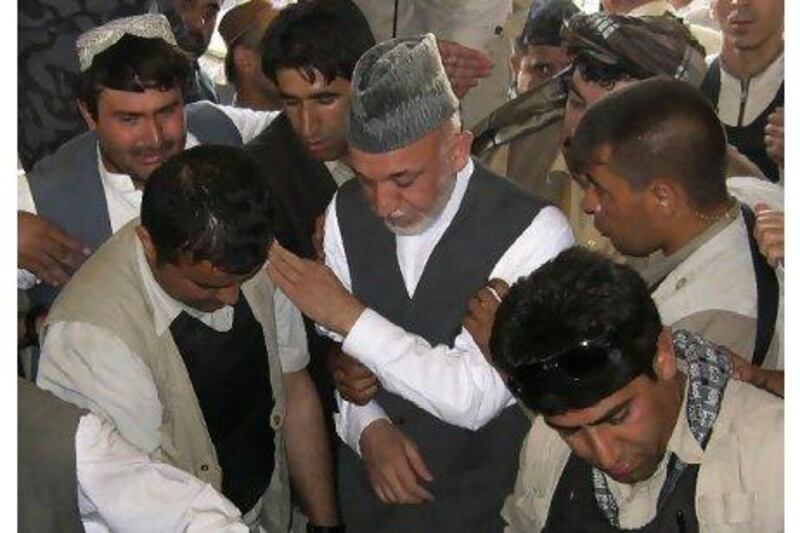KABUL // The assassination of Ahmed Wali Karzai is raising fears of a power struggle in Afghanistan's already volatile south, the region where he held the most sway.
The 49-year-old half-brother of Afghan President Hamid Karzai was shot dead by one of his closest security aides at his home in Kandahar province on Tuesday morning.
Yesterday, President Karzai flew to Kandahar to attend the funeral, where thousands of tribal leaders, government officials and ordinary people paid tribute to Kandahar's provincial council chief.
The sea of mourners surged towards the grave as a wooden casket, adorned with red flowers and carrying Ahmed Karzai's body, was brought forward. Helicopters, for security, circled overhead and the casket was lowered into the earth.
During a news conference in Kandahar yesterday, President Karzai said: "My message for them [Taliban] is that my countrymen, my brothers, should stop killing their own people. It is easy to kill and everyone can do it, but the real man is the one who can save people's lives."
While there was little evidence that the Taliban, who are waging an anti-government insurgency in Afghanistan, were responsible for Ahmed Karzai's death, locals are worried the Islamist movement, already deeply entrenched in Kandahar, will use the strongman's assassination to sow chaos in the country's south.
Mahmoud Karzai, Ahmed Karzai's brother, said that the assassin, Sardar Mohammed, was "hated by the Taliban". Mohammed was shot dead by other bodyguards moments after opening fire.
Analysts say all signs point to the incident having been the result of a personal dispute.
Mullah Naqib, an elder of Kandahar's Alikozai tribe, said: "The Taliban will try to take advantage of this situation, of the power vacuum in Kandahar. Until his successors learn how to do their jobs, the Taliban will step up their activities and try to show their power."
Ahmed Karzai, through his personality and crucial connections to the central government, was the crux of an alliance of rival tribes, businessmen, armed militias, Nato forces and opium smugglers.
His abrupt demise, amid a recent Nato push to stabilise the Afghan south, has left a vacuum where all of these elements may violently vie for power in one of Afghanistan's most important provinces.
Mahmoud Karzai said Ahmed's younger brother, Shah Wali Karzai, who reportedly ran a security company in Afghanistan, will assume Ahmed Karzai's post as leader of their Popalzai tribe in Kandahar. But many in Kandahar were unsure if Mr Wali Karzai could fill his shoes.
Mohammed Nasir Mobarez, the head of a construction company in Kandahar, said of Ahmed: "Because he had a unique character and good connections, I don't think there is anyone who can replace him."
Many of Nato's most lucrative reconstruction projects were funnelled through Ahmed Karzai in Kandahar, where he doled out funds to loyal business associates.
"No Kandahar warlord would even think to begin their activities again with Ahmed Wali Karzai in power," Mr Mobarez said, in reference to tribal militia commanders who once terrorised civilians and set up unofficial checkpoints on the province's roads. "We are going to face chaos in Kandahar," he said.
While Ahmed Karzai was seen by many, including Nato officials, as a stabilising force in an otherwise tumultuous and violent province, there are others who viewed him as more of a Mafia-style crime boss that operated outside the law.
One Kandahar-based journalist, who wished to remain anonymous for fear of retribution, said Ahmed Karzai was a petulant meddler in normal government affairs, running his own personal political and economic fiefdom that intentionally circumvented Kandahar's already fragile institutions.
"There was no boundary to his authority. He was more powerful than the official governor of Kandahar," the journalist said. "Now that he is dead, the real governor will be able to work without someone sabotaging his attempts to govern."
It is a sentiment echoed widely in policy circles in the Afghan capital, Kabul. Reports say western officials were searching for a way to sideline Ahmed Karzai in a bid to flush out high-level corruption in the Afghan government.
Ahmed Karzai was accused of profiting handsomely from the cross-border opium trade in the southern provinces, as well as helping his brother win the 2009 presidential election by stuffing ballot boxes and setting up ghost polling stations.
Analysts say the Nato strategy of relying on Afghan powerbrokers to oppose the Taliban is one that is replicated across the country, and unlikely to change as foreign troops eye the exits in Afghanistan.
The US recently supported the Afghan government's appointment of Brigadier General Abdul Raziq, a Kandahar-based border policeman alleged to have committed human-rights violations, as Kandahar's chief of police.
Brig Gen Raziq, 32, does not hold the same political stature as Ahmed Karzai. But having already secured Kandahar's top security post, a position on which Nato forces rely heavily, locals say he stands to benefit from Ahmed Karzai's death.
"Abdul Raziq may not try get the same power Ahmed Wali Karzai had, because he came to this position with his [Ahmed Karzai's] support," Haji Nik Mohammed, a Noorzai tribal elder in Kandahar's Panjwayi district, said.
"But he will support anyone who takes over from Ahmed Wali Karzai's family."
[ foreign.desk@thenational.ae ]
* With additional reporting from Bradley Hope in Cairo





